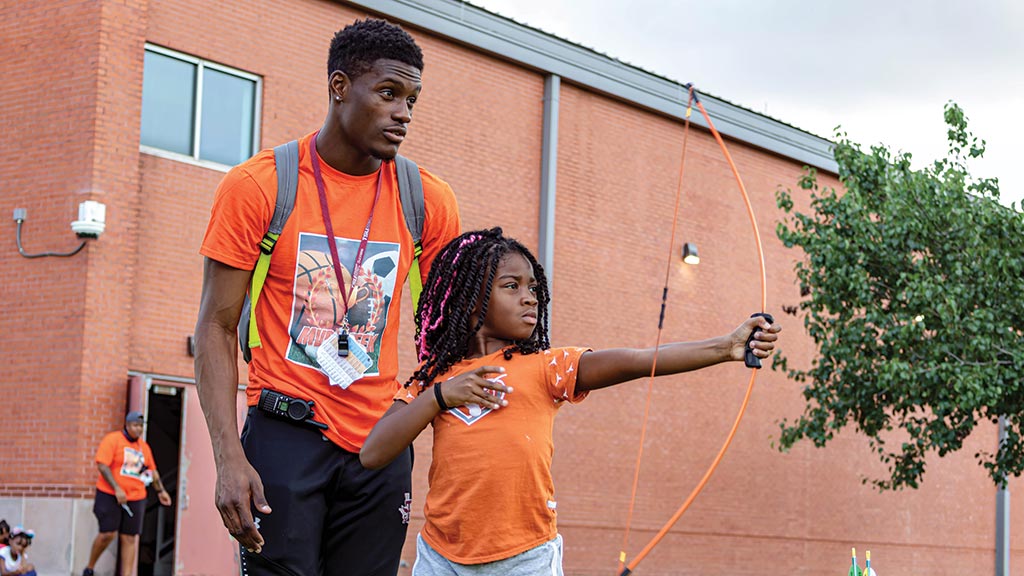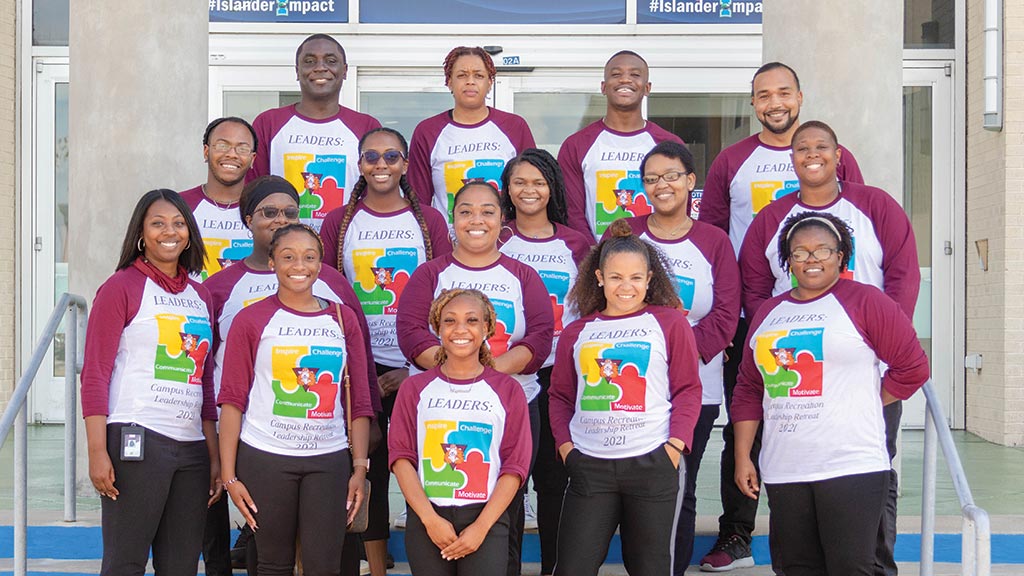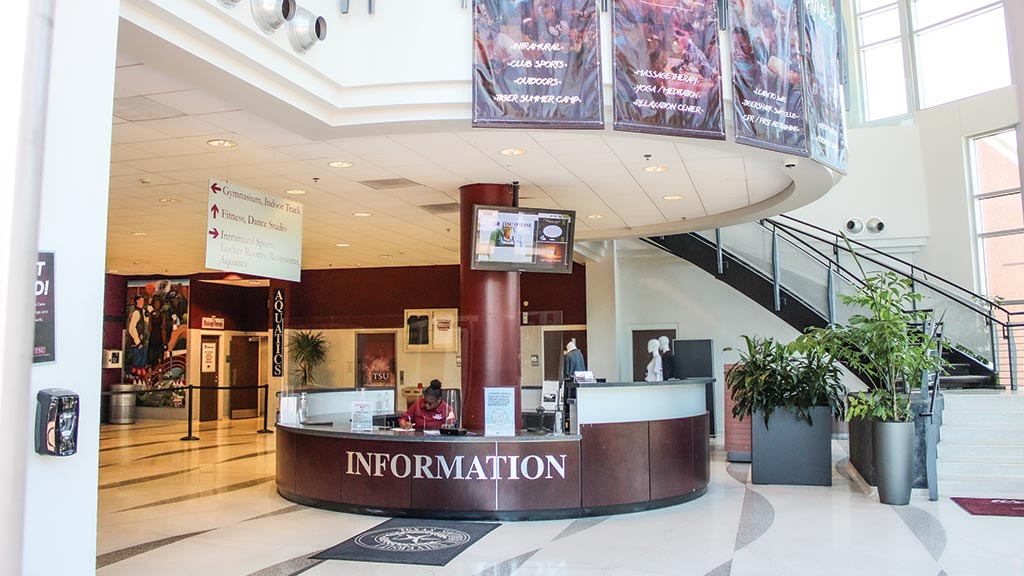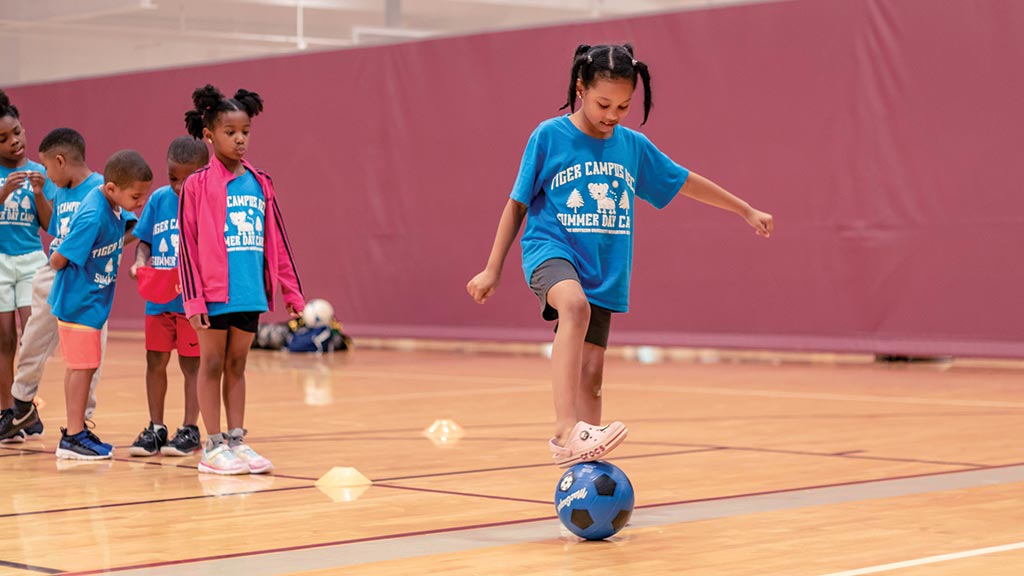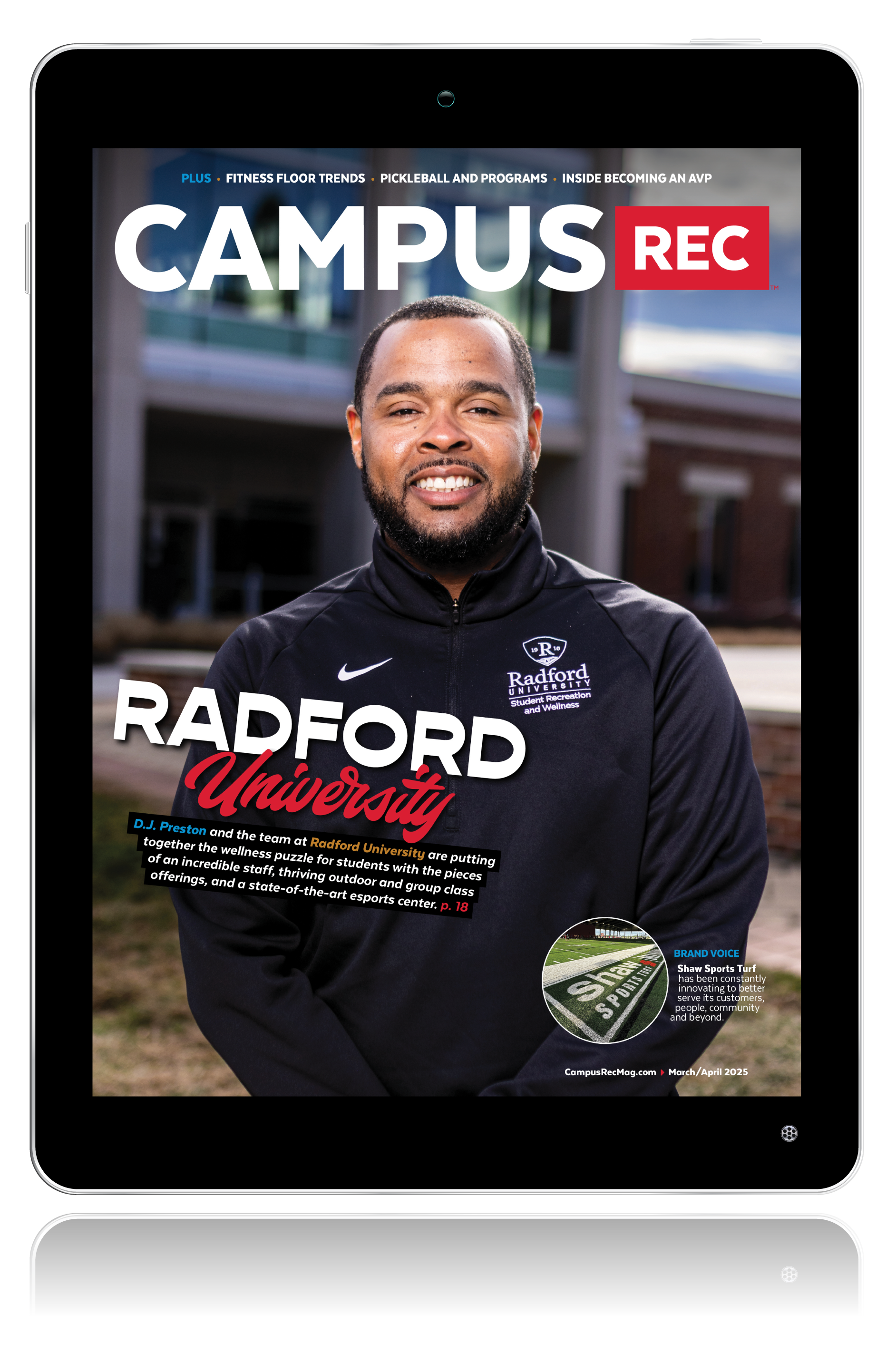Dimples Lee, Juanita Pierce and Viggo Wallace have at least two things in common: they are each founding members of NIRSA and they are each from Texas Southern University (TSU).
In 1950, 20 intramural directors from 11 Historically Black Colleges and Universities (HBCUs) gathered for the first Intramural Conference. It was this rich history that Iisha Voltz, the director of Campus Recreation and Wellness, found herself part of.
Attending TSU as an undergraduate, Voltz started as a fitness attendant, working her way up to the program manager. The director of the program at the time showed her the ropes. “He introduced NIRSA to me and informed me we were one of the founding schools,” she shared. “That right there was like, ‘Whoa, ding-ding-ding, lightbulb.’ So, I was really eager to learn about it and be involved.”
Voltz recalled attending her first NIRSA solo was an intimidating experience at first. But landing in the welcoming environment that is the national conference and industry of campus rec, she was soon at home. “Ever since then, we have been actively involved in NIRSA,” she said.
That active involvement keeps the rich history of TSU alive. But so does the work they’ve done highlighting the three founding members. Voltz shared whether it’s during homecoming or Black History Month, they aim to shed light on their past.
However, three founding members of NIRSA aren’t the only part of TSU’s rich history in campus recreation. It is also one of the first HBCUs to have a standalone recreation and wellness facility.
A Closer Look at TSU Operations
Opening in 2002, the TSU Recreation Wellness Center is about 70,000 square feet. Within you’ll find:
- Administration offices
- A massage room
- A relaxation center
- A lounge area
- An eatery
- An aquatics center
- A fitness area
- A group exercise studio
- Locker and shower rooms
All of it is operated by students. “We allow our student managers to run the entire operational component of the facility during their shifts,” said Jeremy Lewis, the assistant director of Recreation and Wellness. “It gives them a chance to gain valuable leadership experience and develop transferable skills that will only help them as they continue on their journey.”
Lewis explained the “student manager on duty” concept was implemented a few years ago. It allows undergraduate student employees to work their way through the ranks.
Helping them do that is the Student Leadership Development Program, because as Lewis shared, the foundation of staffing is student development and leadership.
EXTRA CREDIT: Two leaders in campus recreation share how they are training and supporting student staff during their college experience.
The program was created to identify qualified student employees who have demonstrated leadership qualities and an interest in learning more about the campus recreation industry. Voltz shared they see 20 to 25 students participate in the year-long program and participants are nominated by a supervisor.
In addition, the program is for students interested in becoming part of the Student Leader Council advisory committee.
Voltz shared the program gives students a map of success and teaches them how to be a leader, versus just putting an employee in a leadership position because they’ve been around for a while. “We wanted to show the steps in becoming a leader,” she said. “Even though we have put you in a leadership program, now you have to learn what it is to be a leader.”
Participants receive training on different topics pertaining to leadership, conflict resolution, etc. They are held accountable with developing and implementing programs. In addition, they are required to hold meetings and communicate with peers. Plus, they mentor new and returning employees.
“We put a lot of responsibility on them,” shared Voltz.
For example, student Keeanna Swain was encouraged to apply to be part of the Student Leadership Council for the 2020-2021 school year. She applied and was accepted as the operations team lead.
“Starting off as a leader in the Fall 2020 semester, I doubted myself a lot because I had never been in a leadership role, so it was trial and error for me,” said Swain. “Once I received acknowledgements from my coworkers and management staff, I knew I needed to keep pushing myself to become the leader I can be.”
But that wasn’t even the biggest challenge. Swain led a department of newly employed first-year students through COVID-19 restrictions during the Fall 2020 semester.
EXTRA CREDIT: If you’re a manager of a student team that needs to rebuild, now is the time to focus on building your team’s tacit knowledge and skills.
“I prevailed through this challenge and semester with the help of two managers who gave me essential leadership tips on how to relate to staff, while also making sure they are engaged with campus recreation,” she said.
In fact, Swain became a Student Manager on Duty in Spring 2021. “I knew then that my efforts in becoming a better leader in campus recreation were finally paying off,” she said.
Swain isn’t alone in her growth as a leader at TSU. Cameron Smith, the president of the Student Leadership Council, shared when he first stepped into the role, he didn’t think the job was for him. As time passed, he has grown into it.
“I believe the top lesson I’ve learned since being under campus recreation is to never give up no matter what the situation is or how hard an obstacle is — you have to keep pushing and putting your best effort forward,” said Smith. “At the end of the day, you have to keep pushing and make a negative into a positive. I’ve learned to not dwell on what is or isn’t going right but to learn and progress.”
Tiger Serenity Relaxation Center
The idea of learning and progressing is evident in TSU Recreation and Wellness. Take for instance Tiger Serenity Relaxation Center, which Smith is also the team lead of. Opening in 2018, the center was a collaborative project led by the Student Government Association (SGA) and Recreation and Wellness.
Interestingly, when the SGA president approached the TSU vice president inquiring about a space focused on student mental health and wellness, it wasn’t a brand-new idea.
Voltz had just told the vice president about a space she wanted to create with a similar goal. Growing up in a family focused on mental health and mindfulness, she was acutely aware of the growing need on campus for such a space. “The vice president at the time, he was like, ‘Well, you’re getting your wish,’” she recalled.
Tiger Serenity is a technology and study-free zone with programs and services that integrate the mind and body. Inside, the Tiger Spa offers massage therapy. Students can participate in live and pre-recorded self-guided meditation sessions — led by an Amazon Alexa — or yoga classes. Another features include:
- A mirror waterfall.
- Comfortable seating.
- Herbal teas served on Tuesdays and Thursdays.
- A section where students can paint or color, and more.
“This is a place where you can unwind, relax and create,” said Voltz.
While it was hard at first for students to get the concept of no technology in the center, Voltz said it’s finally clicked. “I think they want that break; they might not know they want it, but once they break, they see how much it’s needed,” she said.
Tiger Summer Camp
Another way TSU has continued to progress is in its hiring and onboarding process for its Tiger Summer Camp staff. Voltz explained they went through a lot of transitions at first. “We finally found a recipe that works with our hiring,” she said.
It is a three-phased process: Step One is an interest meeting for those wanting to become a counselor. Step Two is the interview process. And Step Three is a one to two hour-long simulation of how a day in camp will actually go.
“We give them arts and crafts they have to develop as a team; we give them situational questions they may have to go through with a camper and for them to answer as a team,” said Voltz. “We want to give you exactly what you are signing up for. We’re very transparent.”
That transparency is a true aspect of the staff as well. In fact, Jessica Allen, the Membership and Promotions coordinator, shared it has allowed for a genuine culture to grow. “TSU Recreation and Wellness has always maintained a warm, family-like atmosphere that feels like a home away from home,” she said.
EXTRA CREDIT: The University of Maryland, Baltimore County has been able to net hundreds of thousands of dollars through its summer camps.
A home away from home is right. Voltz shared that currently all members of the team, except for one, have progressed from student employees to leadership positions within the department, herself included. They are a close-knit group enthusiastic about campus recreation.
Like the rich history that keeps them grounded in their roots, the family-oriented culture keeps them grounded in a genuine environment of sincere care and welcoming. Voltz found a home when she went to her first NIRSA. She has returned the favor by helping provide a home for students and professional staff alike at TSU.
“We focus on you growing as an individual and using campus rec as your beacon,” she said. “I always tell them the sky’s the limit. I mean, Campus Recreation — you can do anything. It doesn’t matter what major you’re in or what career path you decide. You’re going to learn it here.”



